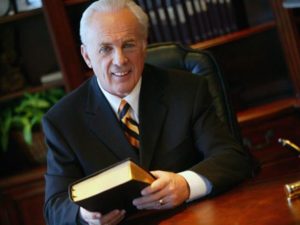In the latest “Law and Order” episode of the GOP’s march toward theocracy, the Arizona Senate passed Senate Bill 1151, which would allow the Ten Commandments to be displayed and read in public schools.
“The progressive slide down in our country right now is because we have taken the Ten Commandments away from our schools,” Sen. Anthony Kern claimed on the Senate floor.
In addition to the Ten Commandments, the law includes the display or reading of:
- U.S. Supreme Court decisions
- The Declaration of Independence
- The National Anthem
- “In God We Trust”
- The Pledge of Allegiance
- U.S. “history and heritage” documents
It passed 16-12 in a party-line vote.
Anne Laurie Gaylor, cofounder for the Freedom from Religion Foundation, criticized the bill, insisting Arizona public schools have “no business telling school children how many gods to worship or what gods to worship or whether to worship any gods at all.”
Given how the Satanic Temple has responded to these overreaches of government by arguing in favor of religious liberty and adding their own displays or after-school programs to the existing list of evangelical options, one might wonder if a good response would be to add other non-Christian religious materials to the bill.
“If conservatives want us to read the Ten Commandments, then let’s read them.”
But in the case of the Ten Commandments, one of the responses needs to be to go along with the conservative game being played here. If conservatives want us to read the Ten Commandments, then let’s read them. But rather than reading them at a surface level of how they may or may not be used as a culture war weapon of 21st-century United States politics, let’s dive into the Ten Commandments for their original context.
The irony is, when we do this, we undermine the entire basis for modern conservative evangelical Christianity.
The Ten Commandments as a moral code
Like the Arizona Republicans, many evangelicals view the Ten Commandments through a modern 21st-century political lens. In this world, God gave humans the Ten Commandments in order to reveal to us how we are to behave toward one another. These conservatives believe Democrats refuse to worship God in the right way and therefore reject God’s law.
By removing Ten Commandments displays from our schools, these conservatives believe our society has become like the Israelite society in the book of Judges, which states: “In those days there was no king in Israel: every man did that which was right in his own eyes.”
Fundamentalist preacher John MacArthur says our culture is “committed to the fact there’s no truth, no authority, no rules and no judge.” One evidence of this is the absence of the Ten Commandments in our public schools.
Thus, by posting the Ten Commandments in our schools, we would recommit ourselves to truth, authority, rules and God as our judge, which presumably will bring about moral order once more. So they say.
The Ten Commandments as a driver of shame
At a deeper level in evangelical theology, the Ten Commandments serve not primarily as a way to reveal God’s moral expectations for us, but to drive us to shame in order to reveal our need for Jesus.

John MacArthur
MacArthur explains: “The law makes us feel guilty. That’s its purpose. To show us God’s standard, to demand that we keep it, to exacerbate our sinfulness so it’s inescapable, and then to make us feel the weight of shame and sin because of our condition.”
But lest we become stuck in our shame, MacArthur believes our shame will point us to trust Jesus. “When you get a good look at the law, you know you can’t save yourself, right? … When you get a good look at the law, you see God’s perfect standard. You see that he’s prescribed that you maintain that perfect standard. You see instead of keeping that perfect standard, you are excited to a greater and greater violation of it. You then feel heaps of guilt upon yourself and shame and remorse and anxiety for such a violation. You feel conviction. And as a result, you realize that through the law comes only cursing and, therefore, you are driven to Christ that you might be justified by what? By faith and faith alone.”
Evangelicals shaming public school kids
With those particulars in mind, it’s fair for us to ask: What is the aim of evangelicals in bringing the Ten Commandments into public school classrooms? If the purpose is to provide a moral code, then how is this not the establishment of religion given how the first four commandments have to do with worshiping a particular religion’s god?
“What if their view of the Ten Commandments in the classroom is consistent with their theology of the Mosaic Law?”
But what if the purpose is even darker than that? What if their view of the Ten Commandments in the classroom is consistent with their theology of the Mosaic Law? In that case, their intentions would be to make public school kids feel guilty, to exacerbate their sinfulness and to make kids feel the “weight of shame” and “heaps of guilt” until they helplessly call out for Jesus and become evangelicals.
Just look at what evangelicals already are promoting in public schools with the Good News Clubs. They’re using public school property to talk to kids about how genocide in the Hebrew Bible is a hint of the punishment they deserve for breaking God’s law.
“You were born with darkness in your heart because of sin,” that curriculum teaches. “It saddens Jesus how sinful you are.”
The teacher asks the child, “What punishment do you deserve for sin?” Then the child is expected to answer, “To be separated from God forever in a terrible place of punishment.”
It’s one thing to allow spiritual abuse and religious trauma on school property after school for the children whose parents consent to the abuse and trauma. But these bills are attempting to infiltrate entire classrooms during the day with abuse and trauma for evangelistic purposes — to drive all children to such depths of shame and guilt that they desperately become conservative evangelicals.
And they’re concerned about the Left indoctrinating kids?

Charleton Heston as Moses in “The Ten Commandments,” Paramount Pictures.
God’s perfect standard, or an ancient treaty?
Implicit in all this is the evangelical assumption that the Ten Commandments are “God’s perfect standard.” But are they?
Consider how the Ten Commandments would have been read in their original context.
In the ancient Near East, suzerain vassal treaties were formed between two nations and were comprised of six main components. They began with a preamble, which included a royal decree introducing the king in charge. Then they moved to a historical prologue to describe what had happened between the two parties. The treaties then documented a statement of relationship and the stipulations that were expected to be obeyed. After this, the treaties recorded a list of witnesses. And then they concluded with curses and blessings.
With that context in mind, consider the Ten Commandments in Exodus 20:
- Preamble — “And God spake all these words saying, ‘I am the Lord thy God.” (verse 1)
- Historical prologue — “…which have brought thee out of the land of Egypt, out of the house of bondage.” (verse 2)
- Statement of relationship — “Thou shalt have no other gods before me. … for I the Lord thy God am a jealous God.” (verses 3 and 4)
- Stipulations — the commands themselves (verses 3-17)
- List of witnesses — “And all the people saw … ye have seen …” (verses 18-22)
- Curses and blessings — “I will come unto thee, and I will bless thee.” (verse 24)
The Ten Commandments recorded in Exodus 20 are structured not by God dictating a simple list of 10 rules to Moses word for word, but by national treaties designed by non-Israelite empires.
Because its basic structure was forged by Egyptian, Hittite, Assyrian and Babylonian empires, we have to admit that to some degree, the Ten Commandments were affected by culture. Even if one assumes biblical inspiration, any fundamentalist certainties about the Law as “God’s perfect standards” have to open up to some questions about how culturally formed the commandments were.
God’s perfect standard, or a defense of patriarchy?
Next to biblical authority and salvation, the most fundamental concern of conservative evangelicals is the defense of what they consider to be “biblical marriage,” which they define as a monogamous relationship between one man and one woman for life.
But Beth Allison Barr points out in The Making of Biblical Womanhood that “the word ‘marriage’ never appears in the Hebrew text.” She shows how the 1611 KJV inserted the subheading “Institution of Marriage” prior to Genesis 2:22-24 despite the fact “neither the word ‘marriage’ nor the word ‘wife’ appear in the Hebrew text.”
Instead, the word English translators call “wife” simply means “woman.”
“If this sounds patriarchal, it’s because it is.”
If this sounds patriarchal, it’s because it is. Hebrew Bible scholar Sandy Richter explains: “Marriage in the ancient world is very different from marriage in our world. Marriage was not the individual choice of two adults of legal age based on chemistry and compatibility. Marriage was an alliance between two families designed to distribute wealth in a mutually beneficial fashion. Even when chemistry was in the mix … economic advantage was still the controlling objective.”
According to Richter, the purpose of marriage was “to provide legitimate heirs for the household.”
So consider that cultural background when reading what the Ten Commandments have to say about coveting.
Exodus 20:17 says, “Thou shalt not covet thy neighbor’s house, thou shalt not covet thy neighbor’s wife, nor his manservant, nor his maidservant, nor his ox, nor his ass, nor any thing that is thy neighbor’s.”
In her book Marriage in the Bible: What Do the Texts Say?, biblical scholar Jennifer Bird writes “Perhaps most telling for our conversation is that both versions of the 10th commandment, about not coveting, list a man’s woman among his possessions. … In both cases, it is clear that a woman is property and not on equal standing with her man.”
Because women were viewed as a man’s property, commands in the Bible about fornication, adultery and homosexuality are discussed in male-centric, patriarchy-driven economic terms.
Even if we set aside the questions related to defining marriage in the Ten Commandments, we still have problems related to slavery. Instead of the 10th commandment condemning slavery, it assumes slavery without the slightest critique of it.
So is that God’s perfect standard? Is it a defense of patriarchy? Should we scrap the entire Bible? Was God accommodating the culture in some way? Or is there some other way to consider the commandments?
Engaging evangelical assumptions
Responding to these cases of evangelicals attempting to import the Ten Commandments into the public school classroom should have a multifaceted approach. Of course, we should confront them on legal grounds. And sure, we need to demonstrate how supremacist they are when they won’t allow other religions to do the same things they do.
But we also need to engage their assumptions about the Bible, the Law, salvation and marriage because any basic exploration of the ancient context will deconstruct their fundamentalist certainties if handled with curiosity and honesty.
If the Ten Commandments are patterned after ancient empire treaties and in defense of patriarchy, then the Bible as an inerrant revelation of God’s perfect standard needs to be placed on the table for some questions.
If the Ten Commandments and the Law are not God’s perfect standard, then the entire conservative evangelical narrative of Jesus having to obey God’s perfect standard in order to earn righteousness that can be imputed to our account by faith needs to be placed on the table for some questions.
If salvation by imputed perfection and punishment is questioned, then the “weight of shame,” “heaps of guilt” and threats of violent punishment evangelicals want to import into the public school classroom need to be placed on the table for some questions.
And if their entire hierarchical understanding of the gospel is questioned, then the male-dominated hierarchies they promote to live out the gospel fall like a house of cards.
While there may be some legal or peer pressure components to our engagement of evangelicals who want to bring the Ten Commandments into public schools, our counter to authoritarian Christianity needs to be a theological project. Fundamental to the politics they are wielding over us are theologies about the Bible, the Law, salvation and marriage that have way too many causes for reasonable doubt.
Conservatives often accuse us of being the serpent, questioning if God really said something. In the case of the Ten Commandments and public schools, it might be good for conservatives to confront the serpent’s question: “Did God really say that?”

Rick Pidcock
Rick Pidcock is a 2004 graduate of Bob Jones University, with a bachelor of arts degree in Bible. He’s a freelance writer based in South Carolina and a former Clemons Fellow with BNG. He completed a master of arts degree in worship from Northern Seminary. He is a stay-at-home father of five children and produces music under the artist name Provoke Wonder. Follow his blog at www.rickpidcock.com.
Related articles:
Texas Ten Commandments bill is a bad idea, Tyler and Hollman warn
Donald Trump and the 10 Commandments | Opinion by Robert Sellers


